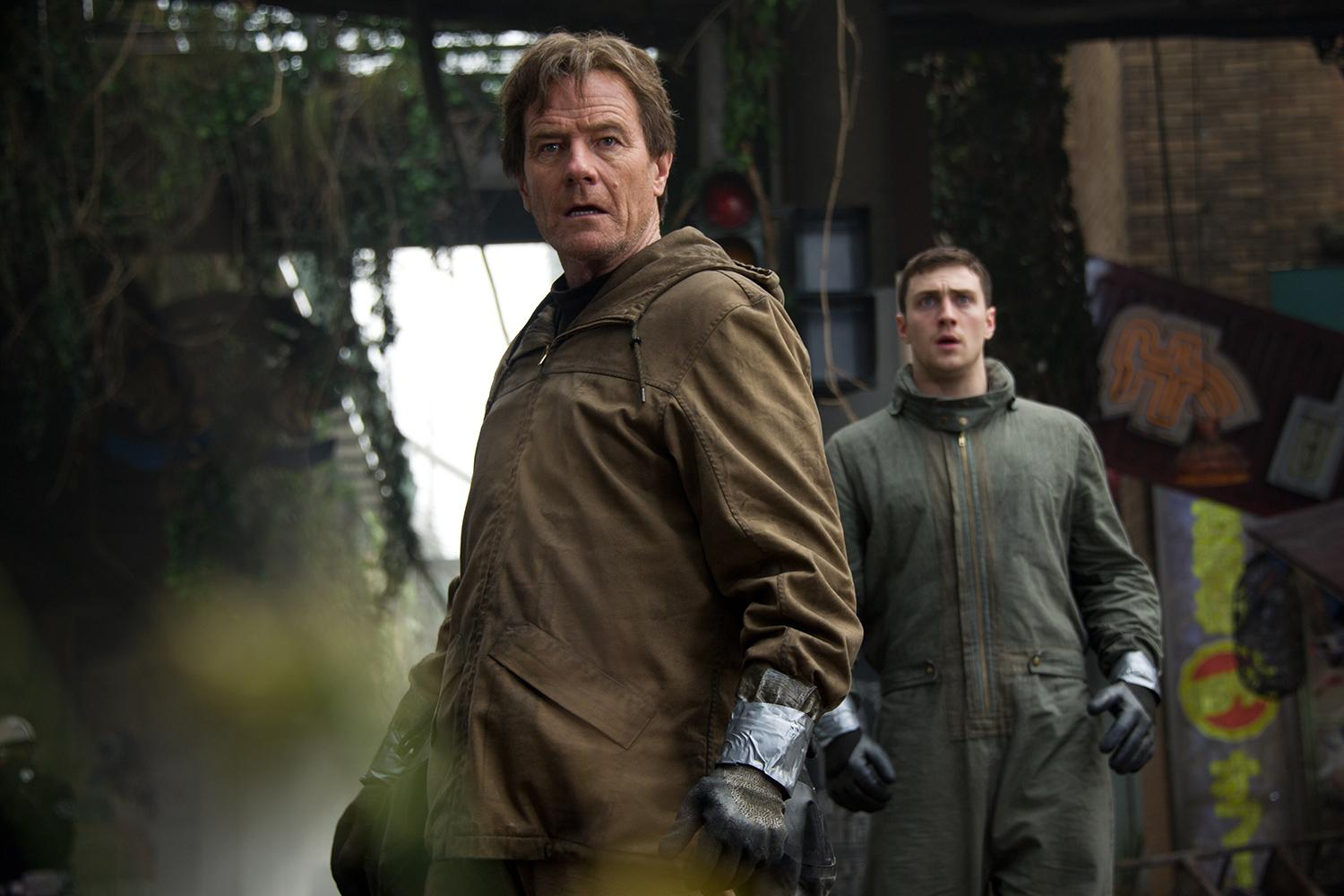As a film, franchise and ferocious force of nature, Godzilla is bigger than any one man. It’s bigger than thousands of men combined, in fact.
This might be a problem, depending on your view of the destruction.
Godzilla, directed by Gareth Edwards (Monsters) and produced by Legendary Pictures, the same studio that brought last summer’s monster-sized Pacific Rim, is less interested in the heart of humanity than it is in its sweeping decimation. It’s a film that all but abandons the need for character development, the need to individualize its human face, opting instead for a wider view of monstrous assaults on mankind.
But it doesn’t start this way. In its opening scenes, Godzilla is as personal as it gets. It’s 1999, and Joseph Brody, a Japan-based nuclear engineer played by Bryan Cranston, senses an anomaly at his power plant. His concerns fall on deaf ears, and it’s up to Joe and his wife, fellow Janjira Power Plant employee Sandra (Juliette Binoche), to dig deeper. Their investigation takes a tragic turn when an apparent meltdown at the reactor claims not only Sandra’s life, but the lives of countless others, rendering the surrounding area completely uninhabitable forever more.
Size matters, especially when rendered at such an impressive scale — but what good is size without a heart?
With that monstrous discovery, Godzilla changes. Its interests shift away from the human story to the creature promised in its title. There’s a very clear distinction between the first and second movements of the film: In movement one, Godzilla tells the story about a man seeking redemption and searching for answers to questions that have haunted him for a decade and change. In movement two, Godzilla plays out from a cold distance, populated by characters without purpose that, more often than not, simply stand around and watch the action unfold, helpless to contribute anything at all.
Even as the second act shifts away from emphasizing the human cast, it shies away from fully revealing Godzilla and his enemies, the Massive Unidentified Terrestrial Organisms, awesomely and repeatedly referred to as “MUTOs.” The MUTOs get more unflinching screen-time than the gargantuan Godzilla himself, rampaging through Hawaii and Las Vegas and other locations for reasons that aren’t fully revealed until much later in the film. As for Godzilla, he’s rarely seen as more than a tail cutting through the ocean, a foot stomping through Honolulu, until the final showdown that unleashes the King of Monsters in all his atomic breath-barfing glory.

Edwards’ decision to restrain Godzilla and the MUTOs, to keep their presence in check until the great release of the finale, is admirable and bold. If it works, it’s thanks to the sheer size and scale of these monsters, compared to the ant-sized men and women scurrying about their feet. You fully buy into these havoc-wreaking creatures and their ability to cut a swath of destruction through the world; you don’t need to see them in their entirety to appreciate their capacity for damage.
The problem is the characters, if you can even call them that. If Edwards and Legendary want their Godzilla movie to keep the destruction in full view but the monsters at arm’s length until the final act, then it ought to be a movie populated by compelling characters. There is precisely one compelling character in all of Godzilla. Cranston brings the weight of the world to Brody, filling the failed engineer’s heart with rage and regret. It’s one of the best performances a modern blockbuster has offered up in years — no surprise, given Cranston’s considerable talents.
But he’s all alone, surrounded by underwritten characters, played by capable actors who just barely show up. Proven pros like David Strathairn and Ken Watanabe do their best as two of the men tasked with navigating the MUTO situation, but they’re ultimately given nothing to do. As Ford’s wife Elle, Elizabeth Olsen is absolutely wasted, surviving on her own charisma, and nothing more. And Ford, the alleged protagonist of the piece, is the weakest link of all; Taylor-Johnson is sleepy-eyed and unengaged as he works his way back to San Francisco to reunite with a family the viewer never really cares about.
As Godzilla shifts from character-centric to monster-mode, Cranston’s Brody is marginalized at best, forgotten at worst. The reason for the shift makes sense, but it’s hard to go there through the guy who makes everyone else look like paper mâché.
Conclusion
Godzilla creates colossal damage on a grander canvas than many summer movies in recent memory. It makes bold choices to withhold the monsters at the heart of the tale, so that when they’re revealed in full, they land with maximum impact. But these triumphs come at the expense of characters that aren’t even worthy of being described as “two-dimensional.” The lone exception is Cranston as Joe Brody, who is sadly sidelined once Godzilla rampages onward to focus on matters bigger than any one man. Size matters, especially when rendered at such an impressive scale — but what good is size without a heart?
(Media © Warner Bros. and Legendary Pictures)
Editors' Recommendations
- 10 most popular movies of 2024 so far, ranked
- Like Godzilla x Kong: The New Empire? Then watch these 3 movies right now
- Like the horror-comedy Lisa Frankenstein? Then watch these three great movies right now
- Like Godzilla Minus One? Then watch these 3 underrated sci-fi movies
- The 5 best Godzilla movies, ranked






